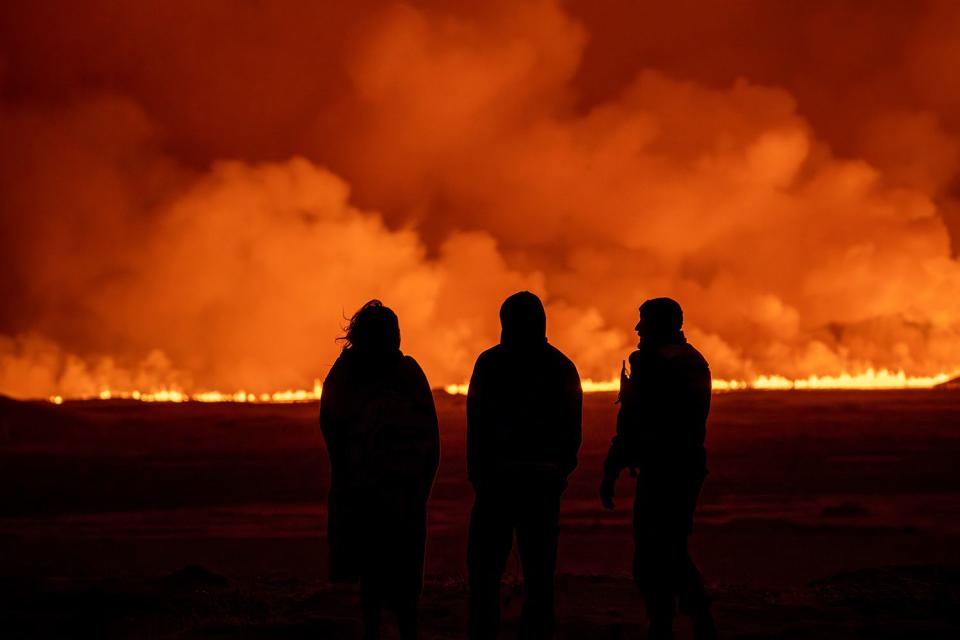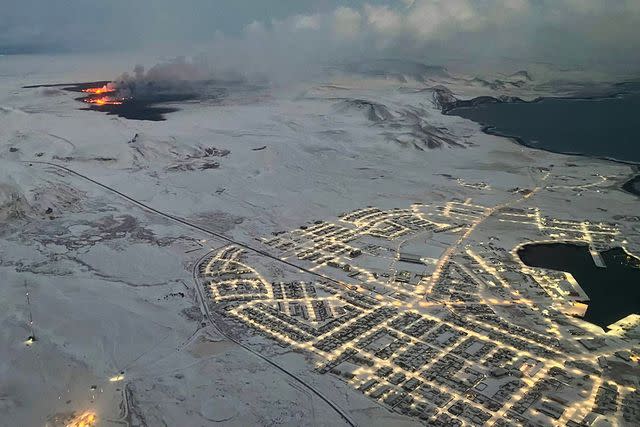Iceland Volcano Erupts, Releasing Lava and Toxic Gases Near Power Plant, Airport and Evacuated Town
The eruption began about 2.5 miles northeast of Grindavík on the Reykjanes peninsula late Monday night

AP Photo/Marco Di Marco
People watch the volcanic eruption near Grindavik, IcelandA volcano has erupted in southern Iceland weeks after residents in the area were evacuated amid increased seismic activity.
The eruption began about 2.5 miles northeast of Grindavík on the Reykjanes peninsula shortly after 10:15 p.m. local time on Monday, according to the Icelandic Meteorological Office.
A “swarm” of earthquakes rocked the coastal area around 9 p.m. that same evening, they added.
A state of emergency has been declared in the area, according to NBC News.
Related: 11 Climbers Dead, At Least 12 Missing After Sudden Eruption of Indonesian Volcano

VIKEN KANTARCI/AFP via Getty
Aerial view of the volcanic eruption near Grindavik, IcelandThe eruption was located on the "dyke intrusion that formed in November," according to the IMO. Thousands of residents were evacuated that same month following a string of intense seismic activity, per the Associated Press.
The volcanic fissure is about 2.5 miles long, stretching from just east of Stóra-Skógfell on the northern end to just east of Sundhnúk on the southern end, according to the weather service.
Never miss a story — sign up for PEOPLE's free daily newsletter to stay up-to-date on the best of what PEOPLE has to offer, from celebrity news to compelling human interest stories.
The intensity of the eruption has since decreased. The IMO said the lava flow is now one-fourth of what it was when the volcanic event began, and as of 2:30 p.m. local time on Tuesday, only one-third of the fissure where the eruption occurred was active.
Gas pollution “might be noticeable in Vestmannaeyjar” on Tuesday and could be detected in the Reykjavík area by late evening or Wednesday morning.
Related: Residents on 'Edge' Facing 2.5K Earthquakes as Italian Supervolcano Rumbles: 'It's Nonstop'
It is unclear how long the eruption will last. Ármann Höskuldsson, a volcanologist, told RUV on Monday that the eruption “could last a week to 10 days” or stop as early as Tuesday evening, according to NBC.
Halldor Geirson, an associate professor with the Institute of Earth Sciences at the University of Iceland, said the eruption “could potentially go on for several months,” per Reuters.
Government officials have said the eruption does not pose a threat to life, according to CNN and Reuters. Flights in and out of the country are not facing disruptions.
For more People news, make sure to sign up for our newsletter!
Read the original article on People.

